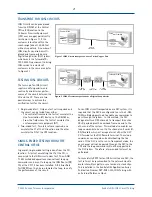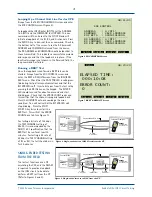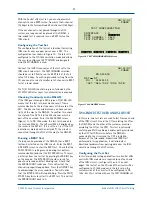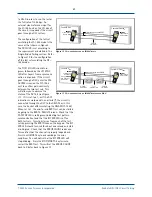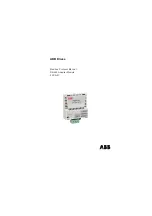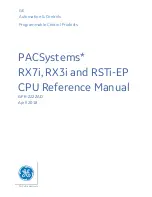
4
© 2001 Sunrise Telecom Incorporated
SunSet xDSL: IDSL Circuit Testing
ADDRESS : 0 (NT1)
EOC CONTROL
COMMAND : 2B+D LOOPBACK
EOC BITS : 000101010000
RX ADDRESS : 0 (NT1)
RX COMMAND : 2B+D LOOPBACK
RX EOC BITS: 000101010000
SEND NORMAL LOOP2BD MORE
08:11:05
---------------------------
Figure 6 EOC CONTROL Screen
ELAPSED TIME:
000:10:08
ERROR COUNT:
0
PAGE-UP PAGE-DN STOP STORE
MEAS
08:23:20
Figure 7 BERT & RESULTS Screen
Looping Up a Channel Unit Line Card or CPE
Escape from the TEST CONFIGURATION screen and enter
the EOC CONTROL screen (Figure 6).
To loopback the IDSL Router (NT/TA), set the ADDRESS
to 0 (NT1) and the COMMAND to LOOP2BD. This eoc
command will then be sent to the NT (CPE) and will
initiate a loopback of the B1, B2, and D-channels. Press
the SEND F-key to transmit the eoc command. Check in
the bottom half of the screen to see the RX (received)
ADDRESS and COMMAND returned from the device.
The RX ADDRESS and COMMAND should be identical to
those transmitted. This indicates a successful command
and response, and that the loopback is in place. If the
identical message is not shown in the Received field, the
loop command has failed.
Running a BERT Test
Once the loopback is confirmed, a BERT test can be
started. Escape from the EOC CONTROL screen and
enter the BERT & RESULTS screen from the IDSL/ISDN
BERT menu. Check that the PAT SYNC LED is solid green
(indicating test pattern synchronization) and that the
BIT ERR LED is off. Inject a bit error from the test set by
pressing the ERR INJ key on the keypad. The BIT ERR
LED should turn red for about one second and start
blinking red. Check that the ERROR COUNT reads one;
this verifies that the channel is properly looped back.
Press the HISTORY key to acknowledge the error
condition. You will notice that the BIT ERR LED will
stop blinking. Press the STOP/
START F-key twice to restart the
BERT test. This will set the ERROR
COUNT back to 0 (see Figure 7).
For testing a bit rate of 144 kbps
(i.e. TEST CHANNEL setting of
2B+D), it is recommended by the
ANSI T1.601 specification, that the
BERT test be run for at least 10
minutes. For testing a bit rate of
64 kbps (i.e. TEST CHANNEL setting
of B1 or B2), the test should be run
for 25 minutes.
SINGLE-ENDED TESTING
FROM THE FIELD
The test set functions as an NT
emulating the CPE, and the DSLAM
is required to provide a loopback
on the IDSL circuit to be able to
perform a BERT test from the CP
(Refer to Figures 8 and 9).
Single-ended BERT to loop
SSxDSL
w/IDSL Module
NT-
1
44K Mode
T
1
or
higher order
U-2B
1
Q
2-wire DSL
U-2B
1
Q
2-wire DSL
to ATM
backbone
Central Office
Customer Premises
DSLAM
DLC
CO
Terminal
DLC
Remote
Terminal
Figure 8 Single-ended test on IDSL Circuit from the CP
Figure 9 Single-ended test over a DLC from the CP
U-2B
1
Q
2-wire DSL
Single-ended BERT to loop
to ATM
backbone
Central Office
DSLAM
SSxDSL
w/IDSL Module
NT-
1
44K Mode
Customer Premises


